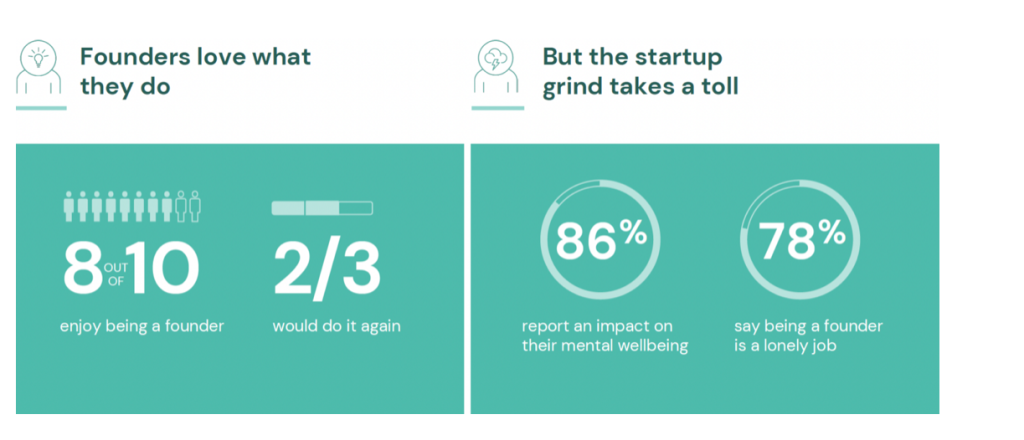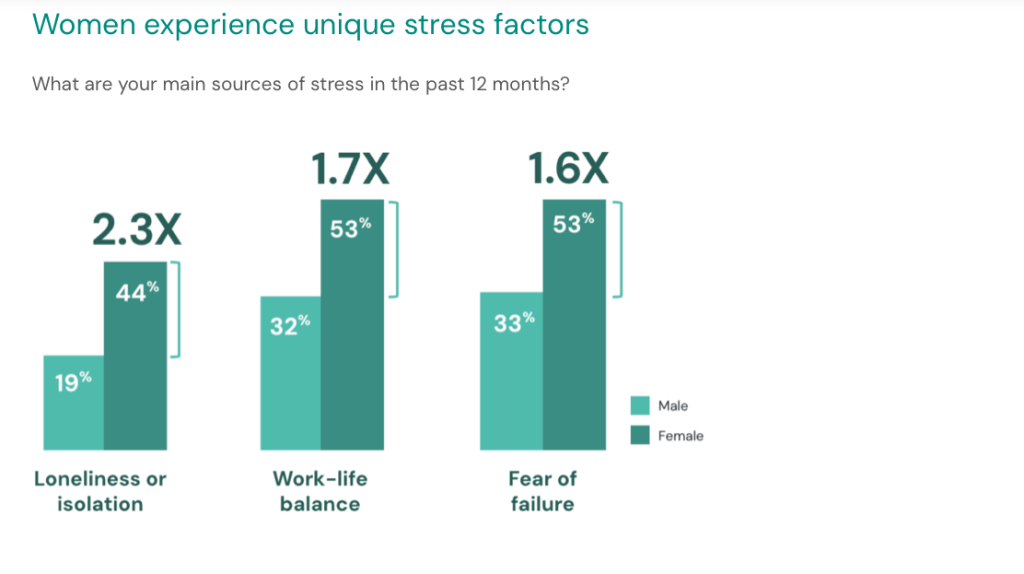86% of founders report that building their startups has taken a toll on their mental health, a survey by early-stage venture capital firm Flourish Ventures has found.
- Although 81% of them enjoyed the entrepreneurship journey, 60% reported feeling anxiety, 58% high stress, 52% exhaustion and burnout, and 20% of the respondents felt depressed.
- The most stressful factors were majorly external, with the pressure to raise capital sitting at the apex with 59%, inflation and currency devaluation following at 44%, and other macroeconomic challenges recording a 40% concern.
- Other stress factors included company management (32%), co-founder relationship (21%), and investor relationship (16%); with women founders experiencing loneliness and fear of failure as unique factors.
“Prioritising founder wellbeing not only has a positive impact on founders’ lives, but also on the long-term success of their business. We hope that by sharing these early learnings, we can jumpstart a broader conversation about the state of founder wellbeing and how founders, and their funders, can better navigate it—in Africa and beyond,” Ameya Upadhyay, Venture Partner at Flourish Ventures said.
“Entrepreneurs are passionate about solving big problems. That sense of purpose is what motivates us and pushes us to keep going. You have to be truly mission-driven to withstand the stress of the journey and prevent burnout along the way,” Belal El-Megharbel, Co-founder & CEO, MaxAB said.

How Founders are Coping with Stress
Startup founders can be creative and ambitious but the business environment in Africa remains a challenging playground that requires immense grit and maneuver. Cognizant of the responsibility they bear in driving success, many startup founders look for ways to cope with their stress. Almost 60% focus on exercise, 49% prioritise reliance on personal relationships, 45% look forward to sleeping better, and 42% ensure they enjoy nutritious and adequate meals.
Startup Founders who stuck religiously to their coping mechanisms reported 13% higher mental wellbeing on average. But openness to what is ailing the founder remains a challenge; with only 14% admitting they were candid with everyone around them about the state of their mental health. Only 42% said they talked to other startup founders whenever they felt stressed. A whopping 78% of the respondents felt lonely.
On the flip side, only 1 out of 5 startup founders revealed what stressed them to their investors. Moreover, only 1 out of 10 founders felt investors cared about their mental health. This ultimately led to 17% of the founders responding that they can be open with their investors – revealing there is still a brick wall between founders and investors – their relationship being limited to capitation and financial obligation.
“While investors provide important financial resources and strategic insight, founders may struggle to manage investor expectations and pressures. This creates an environment where founders are hesitant to have open conversations with their investors,” the report assessed.
“While some level of stress can be beneficial, overwhelming stress is detrimental. Investors don’t have to be soft, but we need to know what’s constructive versus counterproductive,” Ameya Upadhya said.
Women Founders are More Likely to Get Therapy
Women founders are also more likely to get professional therapy compared to male founders. The proportion of startups founders seeking help remains low, only 25% responding that they have visited a therapist before.

This could be attributed to the shortage of therapeutic health care in many African countries and the costliness in terms of time and money. 50% of the founders reported a stigma in their community around talking to a therapist.
The report concludes that investors in the innovation ecosystem need to invest in more than just capital to ensure the mental well being of founders. This includes individual and co-founder coaching, providing wellbeing resources, and leadership training.
“The question is, what role should investors play in helping founders build resilience? Access to tools like coaching and training can significantly enhance founders’ ability to navigate startup challenges,” Emmanuel Adegboye, Head Investor at Madica said.
“While data is powerful, it is ultimately just a starting point for ongoing and open dialogue. Our hope is that this research helps start a conversation, among both founders and funders, about how to build a stronger ecosystem where everyone is set up for success now and in the future,” Efayomi Carr, Principal at Flourish Ventures said.




